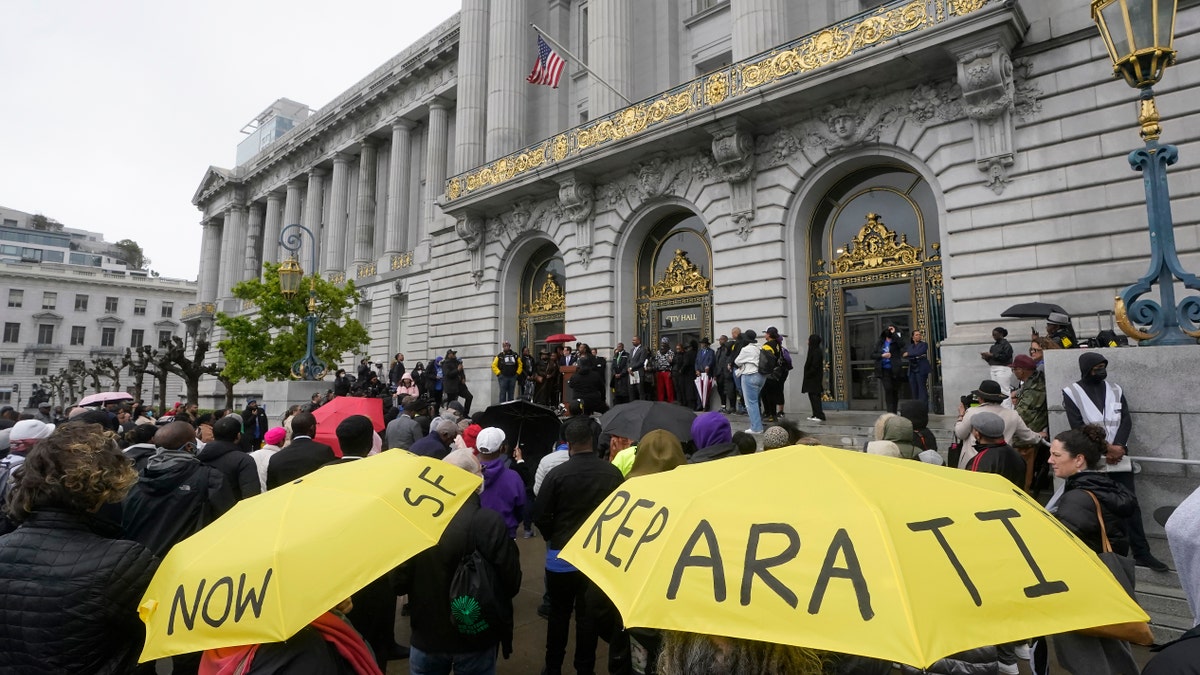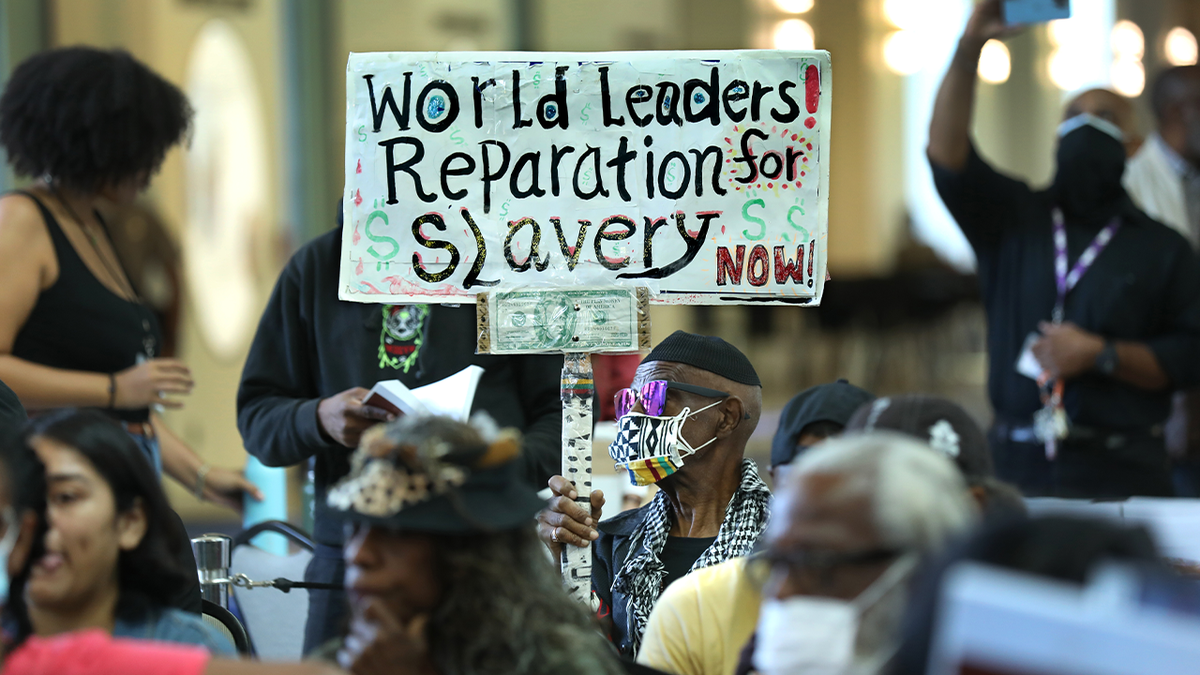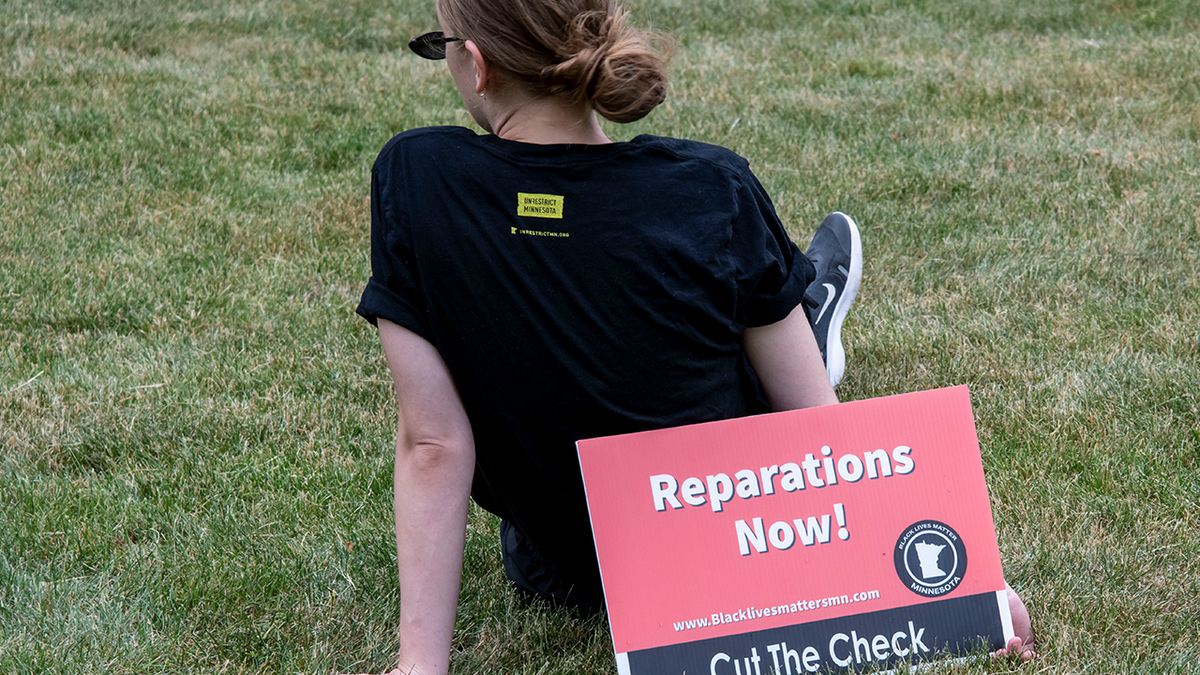Final reparations task force meeting in California gets heated: 'Time for a divorce!'
Several of the attendees at the California Department of Justice’s final Reparations Task Force meeting created a scene during the public comment section of the event Thursday, demanding reparations from the board.
Following the murder of George Floyd and the subsequent calls for American society to have a "racial reckoning," there has been an uptick in support for reparations for Black Americans, but a new think tank report estimates it would cost taxpayers an estimated $15 trillion to close the Black-White wealth gap.
As cities across the country debate whether reparations are justified, Manhattan Institute fellow Charles Fain Lehman examined who would likely be responsible for paying reparations, if they truly serve as a form of compensation for past injustices.
He concluded in his report that the only plausible party from whom you can get the money for reparations is the American government and by extension, American taxpayers. He argues a key problem of such an argument is that many Americans are not descended from ancestors who were in the U.S. prior to abolition.
"That logic becomes much harder to sustain when you have large groups of recent immigrants who are very obviously not implicated in historical injustice and who are also themselves often systematically disadvantaged," he said. "Asking those people to take responsibility for injustices 150 years ago is not something they are necessarily willing to swallow."
SAN FRANCISCO'S PROPOSED REPARATIONS PLAN COULD COST CITY $100 BILLION: REPORT

A crowd listens to speakers at a reparations rally outside of City Hall in San Francisco on March 14, 2023. (AP Photo/Jeff Chiu, File)
Because many Americans did not have ancestors living in the U.S. in the slavery era, Lehman believes it is unjust to ask descendants of post-Civil War immigrants to foot the reparations bill and "with each passing year, immigration further shrinks the population share plausibly eligible to pay a debt for slavery," he wrote.
"Many Americans today are descended from people who arrived after 1865," he told Fox News Digital. "This is most obviously true in the case of Asian and Hispanic Americans, the overwhelming majority of whom came to the states following liberalization [of] immigration in 1965. But it is also true for large proportions of the White population."
Based on demographic modeling techniques, Lehman estimated the percentage of non-Black Americans whose ancestors arrived after the end of the Civil War could be as high as 70%, which includes more than half of the non-Hispanic White population. The remaining 30% of non-Black Americans would be responsible for paying the trillions of dollars in reparations, he wrote in the report.
According to Lehman's estimates, approximately 75% to 90%, or 30 to 36 million Black Americans are eligible for slavery reparations. Lehman estimated that, based on a variety of estimates about how much reparations should be, ranges from $12.9 trillion on the low end, which works out to $360,000–$430,000 per person, to $53.3 trillion on the highest end, which works out to $1.48–$1.78 million per person.
"I think it is telling that there's a fairly wide range of what the actual estimated value of reparations is, and these figures get pretty big, pretty quickly," Lehman said. "The large figure, that $50 trillion figure, is something like two to three times larger than the total annual U.S. GDP."
California's reparations task force recommended that eligible Black residents each receive payments totaling $1.2 million, and the Chicago suburb of Evanston has committed to paying out $10 million in reparations for discriminatory housing policies to its roughly 12,000 Black residents, according to the report.
Reparations have also been proposed or expect to be implemented in other cities in California; Fulton County, Georgia; Shelby County, Tennessee; Boston; Detroit; St. Paul, Minnesota; and Durham, North Carolina.
CALIFORNIA VOTERS ISSUE STRONG REBUKE TO DEM PLAN TO OFFER CASH REPARATIONS: POLL
Proponents of reparations, including Trevor Smith, the Director of Narrative Change at Liberation Ventures, which "accelerates the Black-led movement for racial repair in the United States," believe reparations to be a "shared duty to better our nation for all citizens."
"This brings me to an undeniable truth: the U.S. government owes both a moral and financial debt to Black Americans," Smith told Fox News Digital.
"The history of the United States is indelible, and the call for reparations isn't bound by time — there is no statute of limitations on gross violations of human rights," he added. "Another pivotal aspect of American democracy is the taxation system. There are countless initiatives funded by my taxpayer dollars that I might not personally endorse — for example, subsidizing war overseas. But that's the essence of democracy."

A Los Angeles resident holds up a sign as the Reparations Task Force meets to hear public input on reparations at the California Science Center in Los Angeles on Sept. 22, 2022. (Getty)
Lehman said it is important to understand that for most of American history, the country was almost entirely composed of two racial groups, a large White majority and a small and historically oppressed Black minority.
"As late as the 1960s, America is 99% either White or Black, that is just no longer true," he said. "Thanks to liberalization of immigration, there were large groups of Asians, Hispanics, mixed race people who are neither White nor Black."
"The historical justification for reparations or other inter-group transfers rests in part on the sense that there is one group which has been oppressed and another group which has done the oppressing and transfers from one to the other are A, justified and B, are not a huge disadvantage to or are palatable to the much larger oppressing group," he added.
In the report, Lehman highlighted the fact that America's increasingly diverse population, surging immigration and wealth distribution poses a problem for race-based social policies or any transfer or subsidy proposal justified by historical injustice.
Lehman believes the legitimacy of the arguments in favor of policies like affirmative action, hiring preferences and funding for Black-owned businesses will be less plausible and legitimate as the population changes and America continues to become more diverse.
"To take as an example … the Supreme Court's recent decision, The Students for Fair Admissions case, that decision, I would argue, was possible in part because of the rise of the Asian-American population particularly in the echelons of the most educated," Lehman asserted. "Affirmative action was no longer about doing something specifically beneficial for Black Americans. It was also about taking something away from Asian-Americans."

Demands for reparations for African Americans have grown throughout the country in recent years. (Michael Siluk/UCG/Universal Images Group via Getty Images)
As America grows in its diversity and more of its population, specifically its richest population, is descended from more recent arrivals, Lehman said the argument in favor of reparations will continue to alienate Asian people, Hispanic people and others who don't feel they played a part in the country's historical injustice.
"The reparations project is part of a broader project of redistribution, as I've alluded to, of redistribution on the grounds of historical injustice and to the extent that that project retains credibility or continues to be prosecuted, I think it will increasingly alienate people who feel that they have no part in the historical injustice," Lehman argued.
CLICK HERE TO GET THE FOX NEWS APP
For more Culture, Media, Education, Opinion and channel coverage, visit foxnews.com/media









































